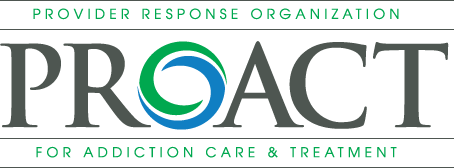By Sheanna Spence
FEATURE / This article was originally published on March 6, 2020, in the online edition of WV Executive Magazine.
The first step is often the hardest.
“The individual has to be ready to admit they have a problem and be willing to make a change,” says Michael Haney, director of the Provider Response Organization for Addiction Care and Treatment, or PROACT. “When they’re ready, we want them to know that we’re here for them.”
Haney, who has served as director of this community-based collaborative since it opened in Huntington in 2018, says beginning the journey toward addiction recovery starts by walking through the door into a judgment-free zone and asking for help.
“When you’re talking about a disease like substance use disorder, you have to meet people where they are,” he says. “That’s really what PROACT is all about.”
PROACT is unique in that it combines all the effective elements of substance use treatment into a comprehensive model and single point of referral. Each element of the PROACT model works in concert with the others to provide a holistic approach to treatment. Services include assessment and referral, both abstinence-based and medication-assisted treatment (MAT) avenues to recovery, individual and group therapy, spiritual care, peer recovery coaching, career placement and social services as well as an on-site pharmacy.
“Clinical evidence of the effectiveness of medication-assisted treatment is more robust than ever,” says Zachary Hansen, M.D., medical director of MAT at PROACT and a provider with Valley Health Systems. “For the appropriate patient population, MAT saves lives. It prevents the spread of infection, decreases legal involvement, increases appropriate drug screens, restores family relationships and enables meaningful employment.”
In addition to welcoming walk-ins and expanding clinic hours, PROACT relies on other community initiatives like Huntington’s Quick Response Team, which follows up with individuals 72 hours after a reported overdose, and Project Engage, a program integrated into the emergency departments at Cabell Huntington Hospital (CHH) and St. Mary’s Medical Center, for referrals. Many community physicians also refer patients who have been diagnosed with a substance use disorder but have struggled to find appropriate care.
PROACT is located at 800 20th Street in Huntington in a renovated building previously occupied by a pharmacy. It is along the city bus route and a walkable distance from downtown and several other Huntington neighborhoods.
“PROACT can only fulfill its mission to reduce the impact of addiction in our communities if we’re proactive in our approach to treatment and accessible to all who need help,” says Beth Hammers, CEO of Marshall Health and president of the PROACT board of directors.
After just 15 months, PROACT has seen more than 1,200 unique individuals for assessment, averaging 86 new patients per month, and offered them a referral to an appropriate level of care based on their individual needs. PROACT now sees about 500 patients each week for ongoing care.
“In Huntington, we’ve embraced the notion that we can’t solve this crisis alone—we all need to work together,” says Haney. “PROACT is the embodiment of that concept.”
PROACT operates as a separate organization with its own board of directors composed of representatives from the partner organizations—CHH, Marshall Health, Marshall University’s Joan C. Edwards School of Medicine, St. Mary’s Medical Center, Thomas Health System and Valley Health Systems. The expertise each partner organization brings to the table is what makes PROACT so unique and what makes it work. It is a true example of what a community can do when it engages in collaborative problem solving.
However, the collaboration doesn’t stop there. Huntington has a wealth of social service and workforce development assets. The PROACT team takes every opportunity to connect patients with the appropriate resources to help them find success in their recovery. PROACT partners with Recovery Point for peer recovery coaching and Marshall Health’s Creating Opportunities for Recovery Employment, or CORE, program, which has developed relationships with local employers ready to hire.
“Partnerships are what is making PROACT successful,” says Hammers. “The relationships PROACT bridges between multiple health care providers and community organizations are what will also help sustain the model and grow its reach for years to come.”
As PROACT leadership looks to future, they are exploring new ways to replicate the PROACT model in partnership with other communities across West Virginia while continuing to increase access in Huntington.

